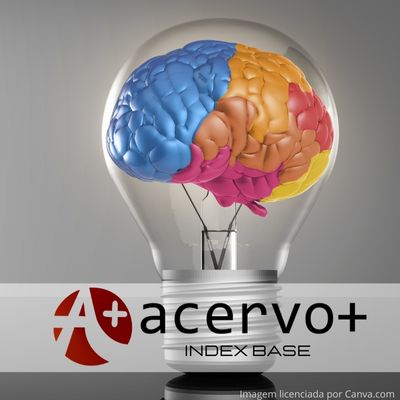Presença da metacognição na formação de equipes de saúde: uma revisão integrativa
##plugins.themes.bootstrap3.article.main##
Resumo
Objetivo: Identificar e analisar produções científicas que exploram o conceito de formação de equipes sob a perspectiva metacognitiva. Métodos: Revisão integrativa, caráter qualitativo. Utilizou-se da estratégia PICo, para o levantamento dos descritores constituídos por: P - Alunos graduação em saúde; I – Perspectiva metacognitivista e Co - Formação de equipes. As bases de dados foram: PubMed, Scielo, BVS, LILACS, Embase, CINAHL, PsycINFO, Scopus, ERIC, Web of Science e Cochrane. Incluindo artigos completos, revisados por pares, na língua inglesa, francesa, espanhola ou portuguesa, sem limite temporal. Resultados: A análise resultou em 4 categorias: (1) Mecanismos utilizados para aumentar a eficácia de uma equipe; (2) Práticas colaborativas e formação de equipe para desenvolvimento de tarefas; (3) Processos cognitivos, afetivos e metacognitivos (CAM) como ferramentas de gestão de equipe e (4) Conteúdo dos pensamentos de alunos que estão envolvidos na aprendizagem em grupo. Considerações finais: Aprender vai além das dimensões epistêmicas e identitárias, e processos metacognivos contribuem para melhorar a comunicação e interação entre membros de equipes favorecendo melhor desempenho nas tarefas simuladas.
##plugins.themes.bootstrap3.article.details##
Copyright © | Todos os direitos reservados.
A revista detém os direitos autorais exclusivos de publicação deste artigo nos termos da lei 9610/98.
Reprodução parcial
É livre o uso de partes do texto, figuras e questionário do artigo, sendo obrigatória a citação dos autores e revista.
Reprodução total
É expressamente proibida, devendo ser autorizada pela revista.
Referências
2. ASSOCIAÇÃO BRASILEIRA DE EDUCAÇÃO MÉDICA (ABEM). Simulação e saúde para ensino e avaliação: conceitos e práticas. 2021. Disponível em: https://issuu.com/editoracubo/docs/issuu-abem. Acessado em: 1 de abril de 2022.
3. AUGUSTINOVA M. Falsification cueing in collective reasoning: Example of the Wason selection task. European Journal of Social Psychology, 2008; 38 (5): 770-785.
4. AVRY S, et al. Achievement appraisals, emotions, and socio-cognitive processes: how they interplay in collaborative problem-solving? Computers in Human Behavior, 2020; 107(1): 106267.
5. BACKER L, et al. Is collaborative learners’ adoption of metacognitive regulation related to students’ content processing strategies and the level of transactivity in their peer discussions? European Journal of Psychology of Education, 2017; 32(4): 617-642.
6. BAE J, et al. Development of simulation education debriefing protocol with faculty guide for enhancement clinical reasoning. BMC Med Educ, 2019; 19(1): 197.
7. BARDIN L. Análise de conteúdo. São Paulo: Edições 70, 2016; 141.
8. BEBER B, et al. Metacognição como processo da aprendizagem. Rev. Psicopedag., 2014; 31(95): 144- 151.
9. BECCARIA LM, et al. The Interrelationships Between Student Approaches to Learning and Group Work. Nurse Education Today, 2014; 34 (7): 1094-1103.
10. BRAMESFELD KD, GASPER K. Happily putting the pieces together: A test of two explanations for the effects of mood on group‐level information processing. British Journal of Social Psychology, 2008; 47(2): 285-309.
11. DINDAR M, et al. What does physiological synchrony reveal about metacognitive experiences and group performance? British Journal of Educational Technology, 2020, 51 (5): 1577-1596.
12. DOMINGUES KCCM, et al. O processo de metacognição durante uma olimpíada de simulação clínica. Revista Eletrônica Acervo Saúde, 2021; 13(10): e8825.
13. DUFFY MC, et al. Team regulation in a simulated medical emergency: An indepth analysis of cognitive, metacognitive, and affective processes. Instr Sci., 2015; 43(3):401–426.
14. EFKLIDES A. Metacognition: Defining its facets and levels of functioning in relation to self-regulation and co-regulation. European Psychologist, 2008; 13(4): 277-287.
15. FLAVELL JH. Metacognition and Cognitive Monitoring. American Psychologist, 1979; 34(10): 900-906.
16. GEERLIGS T. Students Thoughts during Problem-Based Small-Group Discussions. Instructional science, 1994; 22 (4): 269-278.
17. GIESSNER SR, MUMMENDE A. United we win, divided we fail? Effects of cognitive merger representations and performance feedback on merging groups. European Journal of Social Psychology, 2008; 38(3): 412-435.
18. HAYES C, et al. Learning to liaise: Using medication administration role-play to develop teamwork in undergraduate nurses. Contemporary Nurse, 2019; 55(4): 278-287.
19. KILMANN PR, et al. Effects of attachment-focused versus relationship skills-focused group interventions for college students with insecure attachment patterns. Attachment & Human Development, 2006; 8(1): 47-62.
20. KIM YR, et. al. Multiple levels of metacognition and their elicitation through complex problem-solving tasks. The Journal of Mathematical Behavior, 2013; 32(3):377–396.
21. MELNYK BM, FINEOUT-OVERHOLT E. Making the case for evidence-based practice.In: Melnyk BM, Fineout-Overholt E. Evidence based practice in nursing & healthcare. A guide to best practice. Philadelphia: Lippincot Williams &Wilkins; 2005; 3-24. NELSON TO, NARENS L. Why Investigate Metacognition? In J. Metcalfe and A. Shimamura (Eds.) Metacognition. The MIT Press, 1994; 1(1): 1–26.
22. PIAGET J. A equilibração das estruturas cognitivas: problema central do desenvolvimento. (M. M. dos S. Penna, Trad.), Zahra Editors; 1976.
23. PIFARRÉ M. Incidence of group awareness information on students collaborative learning processes. Journal of Computer Assisted Learning, 2014; 30(4): 300-317.
24. POZO JI. Aprendizes e mestres: a nova cultura da aprendizagem. Porto Alegre: Artmed Editora, 2002.
25. PREFERRED REPORTING ITENS FOR SYSTEMATIC REVIEWS AND META-ANALYSES (PRISMA). Disponível em: http://www.prisma-statement.org/. Acessado em: 12 de abril de 2022.
26. REY RR, et al. Ensinar competências não técnicas para atendimentos de emergência: percepções de professores médicos. Revista Brasileira de Educação Médica, 2021; 45 (1): 1-8.
27. SONTAG-PADILLA L, et al. Strengthening college students’ mental health knowledge, awareness, and helping behaviors: the impact of active minds, a peer mental health organization. Journal of the American Academy of Child & Adolescent Psychiatry, 2018; 57 (7): 500-507.
28. STERN C, et al. Developing the review question and inclusion criteria: The first steps in conducting a systematic review. AJN, American Journal of Nursing, 2014; 114 (4): 53-56.
29. VAN V, et al. Newcomers' cognitive development of social identification: A cross‐sectional and longitudinal analysis of self‐anchoring and self‐stereotyping. British Journal of Social Psychology, 2014; 53 (2): 281-298.
30. VOLET SE, et al. Individual contributions in student-led collaborative learning: Insights from two analytical approaches to explain the quality of group outcome. Learning and Individual Differences, 2017; 53 (1): 79-92.

